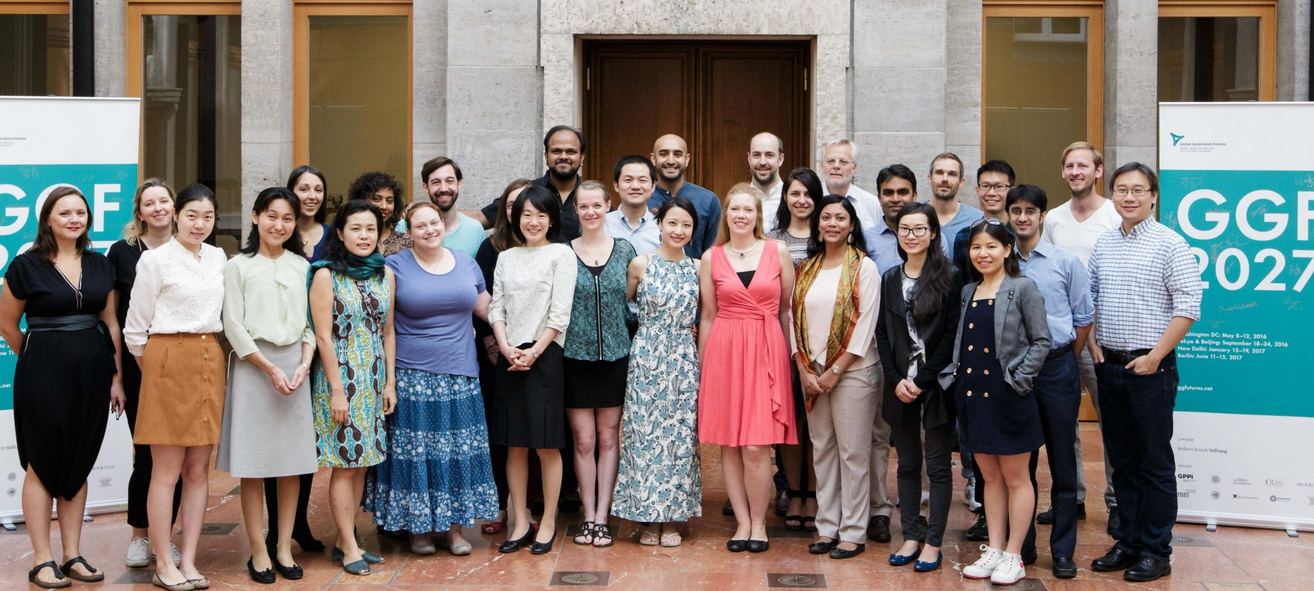Call for Applications - GGF 2030
The Global Governance Futures – Robert Bosch Foundation Multilateral Dialogues program (GGF) is bringing together exceptional young professionals from different professional sectors – academia, civil society, government, NGOs, private sector, etc. – to look ahead to the year 2030 and think of ways to better address key global challenges. Ifri joined the GGF in October 2017 to promote this network of future decision-makers and participate in its activities organized by the Global Public Policy Institute in Berlin.

Building on previous rounds of the program, the next round – GGF 2030 – will assemble 27 fellows from Brazil, China, France, Germany, India, Indonesia, Japan, South Africa, and the United States (three from each country) to form three working groups that focus on the futures of global order, of global migration and refugee crises, and the role of cities in global governance.
Over the course of 2018 and 2019, the fellows will meet in four dialogue sessions. They will engage in challenging discussions within and across their working groups. They will meet with leading experts, policymakers, and business leaders in each host country, receive training in the GGF foresight methodology, produce scenarios for their working group topics, and engage in thinking what can be done to address key global challenges. The GGF fellows will engage in communication within and across different countries and professional sectors with the aim to come up with better policy options for their respective countries and organizations. The GGF fellows will disseminate the results of their working group sessions through a series of GGF products, including presentations, essays, commentaries, podcasts, and online interviews.
The four dialogue sessions (five to eight days each) will take place in Washington, DC (May 13 – 17, 2018), New Delhi (September 9 - 13, 2018), São Paulo (January 2019) and Paris-Berlin (May/June 2019). The exact dates will be determined closer to the sessions.
GGF 2030 Topics
Futures of Global Order
Global power structures are changing. Countries like Brazil, China, India, Indonesia, and South Africa have transformed into important poles of economic growth, technological innovation and political power. A new international development agenda is being spearheaded through the creation of new global financial institutions, including the Asian Infrastructure Investment Bank, boasting the support of nearly all major Asia-Pacific and European powers. Today Mumbai, Beijing, and Tokyo are among the world’s leading centers for innovation and venture capital, and China, Brazil, India are at the forefront of efforts to shift to renewable energy sources. In the security sphere, Russia’s annexation of Crimea and Chinese territorial claims challenge the principals, norms, and values that undergird the common rules observed by the post-1945 world order. At the same time, the West is accused of being arrogant and hypocritical – championing democracy, rule of law, and human rights, while at times acting from opposite positions in the international arena. Will these developments foster rival blocs with competing values and norms? Are we witnessing the creation of parallel world orders? How will this affect our common approach to international development and collective security? And how can we harness these developments in order to collectively combat global challenges?
The Role of Cities in Global Governance
In the fight against global challenges we typically turn to politicians and diplomats for leadership. But cities, and their mayors and civil society groups, also play a crucial role in shaping economic, environmental and social policies worldwide. In the coming decades urban populations worldwide are set to double to more than six billion people, meaning that two in every three people on earth will be living in a city by 2050. In recent years, cities have become a key hinge for effective response to important challenges and making up for national actors on the international stage. From issues like climate change and energy security, to developing smart cities, addressing health challenges and tackling organized crime, cities and their inhabitants are having a catalytic influence on global governance. Will we see cities across the world increasingly implement agreements that national governments fail to do? What will cities, mayors and civil society groups need to jointly advocate and lead policy changes? How can we better integrate cities into global governance structures and processes to tackle the local and global challenges?
Global Migration and Refugee Crises
Global migration has reached an unprecedented scale. Millions of people cross borders every year in search of new opportunities, carrying with them enormous potential to contribute to economic development, address demographic challenges, and foster global interconnectedness. But global migration also carries pressing challenges. Many migrants undertake perilous journeys only to be exploited or face deportation. Women and children are illegally trafficked across international borders and sold into slavery. Even legal migrants are facing a rising tide of xenophobic backlash. Global refugee numbers are continuously rising as civil wars and conflicts rage on. Climate disasters and changing environment will further cause the displacement of hundreds of thousands of people. So far, the response of the international community to these challenges has been fragmented and ineffectual. What would an effective system for governing global migration look like? Can we create a system for better distribution and regulation of refugee flows? How can we address xenophobia and growing radicalization in recipient countries? How can we better protect the rights of refugees? And what are better ways of tackling the root causes of displacement?
To get more information on the application requirements and process, please click here
Deadline: November 19, 2017
For more information about the Program, please contact Lea Metke, Project Officer to the Director ([email protected]).
Suporters and partners


Available in:
Share




